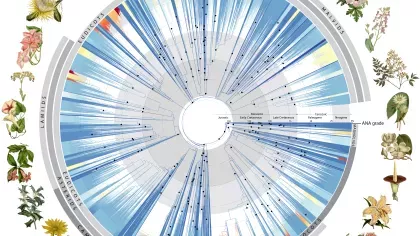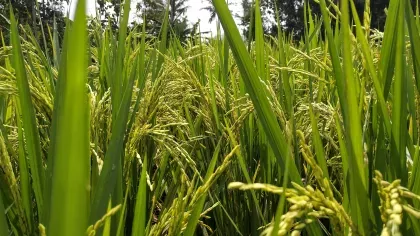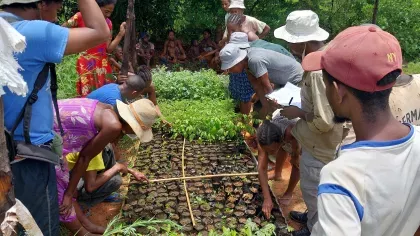25 September 2018
Kew and the UN Sustainable Development Goals
In 2015, the United Nations set seventeen goals with the hope to transform the world and lift millions out of poverty. Kew plays a crucial role in the UK's work to fulfil its commitments.

In 2015, the world came together to work up a way to improve the health of our planet and lift millions of people out of poverty.
The result: the Sustainable Development Goals.
17 goals with 169 targets that 197 countries have agreed to adopt.
As a world-renowned centre for botanical research – and partnerships stretching across 110 countries – Kew is well placed to support the UK in efforts to build healthier ecosystems.
The Sustainable Development Goals
Nine of the 17 goals relate to tackling food insecurity, sustainable agriculture and protecting ecosystems. Four are particularly pressing:
- No poverty - to end poverty in all its forms everywhere
- Zero hunger - end hunger, achieve food security, improve nutrition and promote sustainable agriculture
- Life on land - managing forests, combat desertification and land degradation, and stop biodiversity loss
- Quality education - ensuring quality and inclusive education for everyone
Eradicating poverty and hunger go hand-in-hand. Plants and fungi are the beginning of the food chain and they are the basis of many economies. And we can’t protect those without protecting our land. The health of our planet is crucial in providing the resources to feed people and build livelihoods. Knowledge can connect people to the importance of their environment as well as behaviours they can take to protect it.
Kew and the fight against poverty
Through our cutting-edge research and partnerships, our 2015 – 2020 science strategy emphasises three areas of work that will enable us to achieve those goals:
- To document and conduct research into the global plant and fungal diversity and its uses for humanity
- To curate and provide data-rich evidence from Kew’s unrivalled collections as a global asset for scientific research
- To disseminate our scientific knowledge of plants and fungi, maximising their impact in science, education, conservation policy and management
Our research covers food and fuel crops, medicinal plants, climate change and conservation.
We put that into practice via our scientists who recommend evidence-based approaches to things like sustainable land management, reforestation and preserving biodiversity.
In our annual State of the World’s Plants report, we directly address the nine relevant SDGs with our latest discoveries and knowledge.
Our researchers determine how to make the best use of resources, enhance nutrition and agrobiodiversity.
Through our wide-ranging education programmes, we ensure that communities, children and adults are able to learn about science and horticulture. Whether learning the basics of food production or transforming community green spaces, thousands of people are able to better understand and care for the natural world.
Protecting beans
Pulses, like beans, are a globally important crop.
They provide protein, micronutrients and vitamins. Entire communities get an income from growing and selling these crops.
However, in sub-Saharan African, we are only reaping 20-25% of their potential yield.
Some of that is down to poor pollination and pest damage. Fertilisers and crop protection agrochemicals are expensive and could add further damage.
Kew scientists led a project dedicated to improving bean yields, under the auspice of eradicating hunger and poverty as well as other SDGs.
They identified a plant species that could support pollinators whilst being the natural enemies of the crop pests plaguing the beans; a natural pesticide less harmful to the ‘beneficial’ insects like ladybirds, spiders and wasps and controlled the threats.
We are now working closely with local communities to cultivate this plant and improve the way farmers use natural pesticides.
This is just one piece of the work we do every day to foster a world where we make the best possible use of our natural resources for the benefit of mankind.


